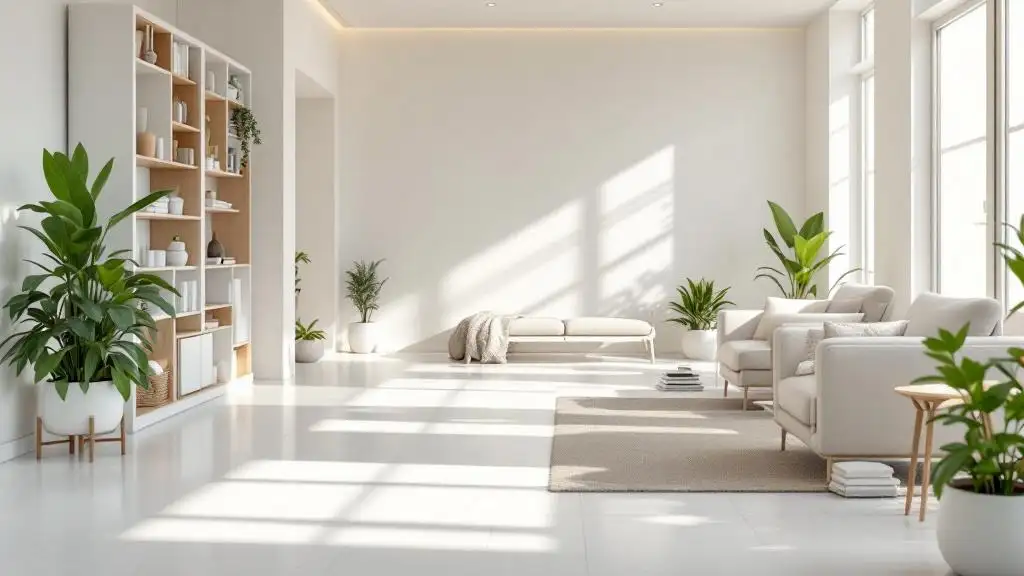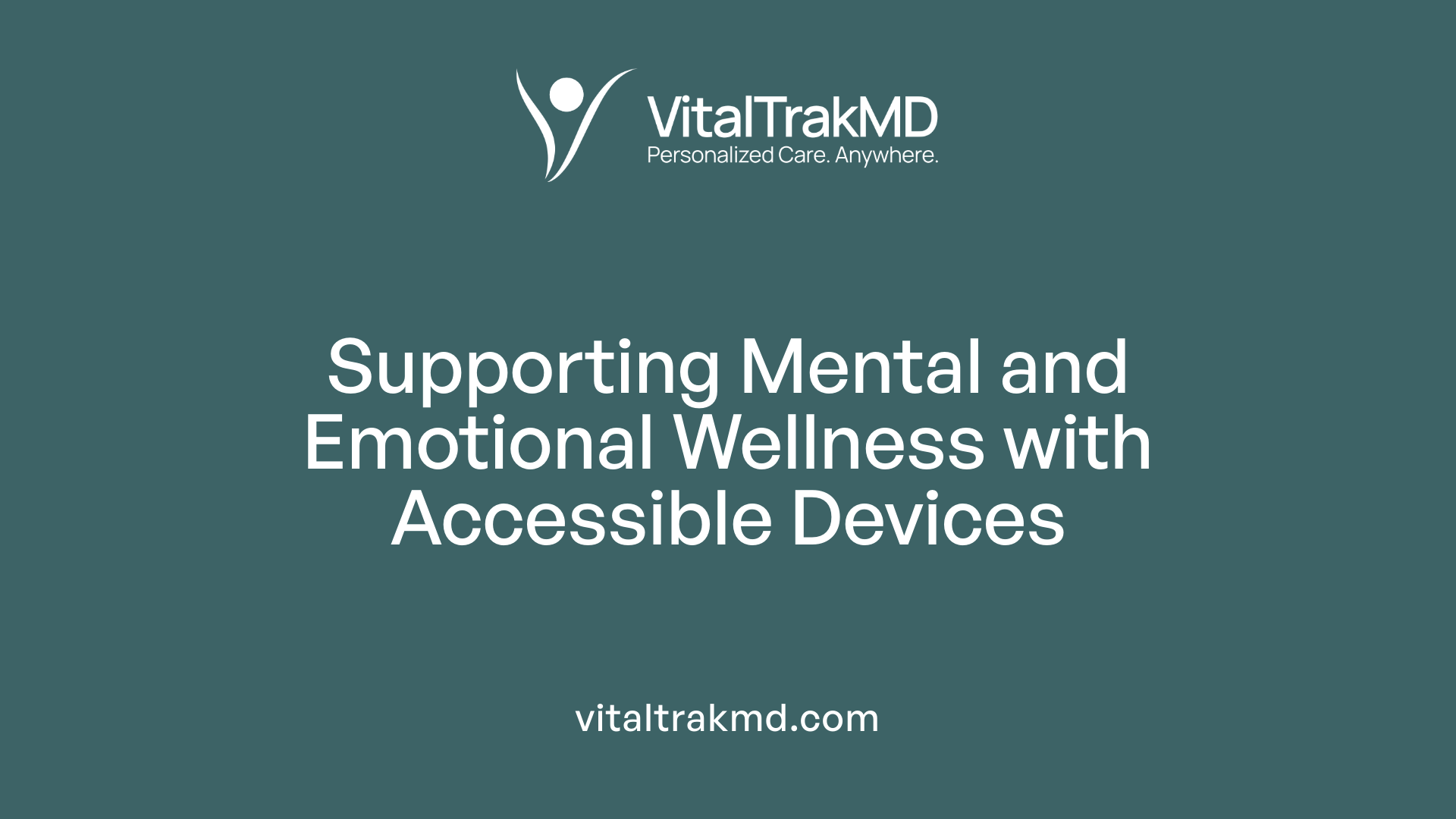Supporting Seniors in Developing Confidence With Technology in Care

Bridging the Gap Between Seniors and Health Technology
As technology continues to evolve, so do the opportunities to enhance wellness and care for seniors. From voice-activated assistants to smart wearables, the integration of user-friendly devices is transforming how older adults manage their health, maintain independence, and connect with caregivers. However, fostering confidence and competence with these tools is crucial for seniors to fully benefit from them. This article explores key technologies supporting senior wellness, the critical role of mental health in weight loss and wellness programs, and how personalized care programs integrate technology to promote sustainable health outcomes.
Smart Technologies Enhancing Senior Wellness and Safety

How Do Voice-Activated Assistants Support Senior Independence?
Voice-activated assistants like Alexa, Siri, and Google Assistant are transforming daily life for seniors by enabling hands-free convenience and safety. These smart assistants help set reminders for appointments and medications, place calls without needing to handle a phone, and adjust smart home environments such as lighting and thermostats. This technology fosters greater independence and peace of mind by simplifying tasks and reducing physical strain.
How Do Smart Medication Dispensers Improve Adherence?
Smart medication dispensers utilize audio-visual alerts and safety locks to ensure seniors take their medicines accurately and on schedule. Remote monitoring capabilities allow caregivers and healthcare providers to track adherence, reducing the risk of missed doses and potential health complications. This innovation supports seniors in managing their medications reliably in their own homes.
What Role Do Wearable Health Monitors and Fall Detection Play?
Wearable devices, including rings, patches, pendants, and smartwatches, continuously monitor vital signs like heart rate and blood pressure. Many models feature fall detection technology that automatically alerts emergency contacts or services if a fall occurs. Additionally, home sensors detect unusual patterns, triggering alerts and environmental controls like lights and door locks to mitigate risks. Together, these technologies enable early intervention and reduce hospital visits.
How Are Telehealth Hubs and Connected Fitness Tools Beneficial?
Telehealth hubs with user-friendly interfaces allow seniors to perform remote health assessments and communicate easily with healthcare providers, improving accessibility. Connected fitness tools tailored for seniors include large fonts, voice instructions, and real-time feedback, encouraging physical activity in a manageable way. These technologies promote overall health by combining convenience with personalized support.
In What Ways Do Accessible Devices Support Mental and Emotional Wellness?
Devices such as televisions with simplified controls and large fonts contribute to mental stimulation and emotional comfort. Wearable technology also aids mental health through cognitive games, social connectivity features, and medication reminders that help reduce loneliness and cognitive decline. The integration of these supportive tools with coaching and personalized advice further nurtures seniors' mental wellness.
| Technology Category | Features | Benefits |
|---|---|---|
| Voice-Activated Assistants | Reminders, hands-free calls, smart home adjustments | Enhanced independence and daily convenience |
| Smart Medication Dispensers | Audio-visual alerts, safety locks, remote monitoring | Improved medication adherence and reduced health risks |
| Wearable Health Monitors | Vital sign tracking, fall detection, real-time alerts | Early intervention, safety, reduced hospital visits |
| Telehealth Hubs & Fitness Tools | Remote health assessments, voice instructions, large fonts | Increased healthcare access and promoted physical activity |
| Accessible Mental Wellness Devices | Simplified controls, cognitive games, social features | Supports mental stimulation, emotional comfort, and cognitive health |
Wearable Devices: Monitoring Health and Encouraging Activity

What health tracking features do wearables offer seniors?
Wearable devices such as fitness trackers, smartwatches, rings, patches, and pendants enable seniors to monitor vital health metrics easily. These devices track heart rate, blood pressure, sleep patterns, steps taken, hydration levels, and even oxygen levels. This constant monitoring fosters greater awareness and management of physical health, allowing early detection of issues.
How do wearables assist with fall detection and emergency alerts?
Many wearables incorporate fall detection technology that automatically senses abnormal falls. When a fall is detected, these devices instantly notify emergency contacts or services, reducing response times and improving safety. Additional features like emergency buttons provide seniors with the ability to call for help quickly whenever needed.
What cognitive and social benefits do wearables provide?
Wearables support mental wellness by offering cognitive games that stimulate the brain, medication reminders to maintain routine adherence, and social connectivity features that reduce loneliness. These functions help slow cognitive decline, keep seniors mentally engaged, and foster social interaction.
How do wearables aid in chronic disease management?
For seniors with chronic conditions such as diabetes or COPD, wearables facilitate medical management by monitoring specific health indicators like blood sugar and oxygen levels. Combined with remote health monitoring and medication reminders, these technologies allow for better disease control and reduced hospital visits.
| Feature | Benefits | Examples |
|---|---|---|
| Health Tracking | Monitors vitals & sleep, encourages activity | Smartwatches, fitness bands |
| Fall Detection | Automatic alerts, emergency notifications | Fall-detecting pendants, wrist devices |
| Cognitive & Social Aid | Brain games, reminders, social connectivity | Apps on smartwatches |
| Chronic Disease Mgmt | Tracks specific conditions, medication aid | Glucose monitors integrated into wearables |
Integrating Mental Health into Weight Loss and Wellness for Seniors
What role does mental health play in weight loss and wellness programs?
Mental health is crucial for seniors aiming to succeed in weight loss and wellness initiatives. Psychological factors profoundly impact motivation, adherence to diet and exercise, and overall lifestyle changes. When mental health is properly addressed, seniors are more likely to maintain healthy habits and achieve sustainable results.
Addressing emotional eating and psychological challenges
Emotional eating can undermine weight management efforts, especially among seniors dealing with stress, loneliness, or cognitive decline. Recognizing and managing these psychological challenges involves incorporating therapy sessions, support groups, and counseling to develop healthier coping mechanisms.
Comprehensive approaches combining therapy and behavioral support
Programs that integrate physical health goals with mental health support show greater success. These may include mindfulness practices, cognitive-behavioral therapy, and behavioral coaching. Personalized assistance from wellness coaches, paired with monitoring via smart devices, ensures seniors receive feedback and motivation tailored to their needs.
Stress management and mindfulness in senior wellness
Stress management techniques, such as mindfulness meditation and engaging hobbies, support emotional balance and reduce risks of emotional overeating or inactivity. Promoting social engagement and providing community resources also enrich seniors’ mental wellness, fostering resilience and encouraging consistent participation in wellness routines.
By merging psychological and physical health strategies, seniors experience improved mental wellness and enhanced weight loss outcomes, leading to a healthier, more satisfying lifestyle.
Effective Care Programs Supporting Sustainable Weight Loss in Seniors
What are the most effective wellness programs for sustainable weight loss?
The most successful weight loss programs for seniors focus on combining a balanced, reduced-calorie diet with regular physical activity. These programs don't just address diet and exercise in isolation but prioritize long-term lifestyle changes reinforced by behavioral therapy and ongoing professional support.
Programs that set realistic goals and tailor plans specifically for seniors tend to foster sustainable results. Continuous monitoring, both through personal coaching and technology, helps prevent relapse and encourages adherence to healthy habits over time.
How can care programs support individuals in achieving their weight loss goals?
Effective care programs deliver personalized guidance alongside behavioral interventions that support emotional and motivational needs. This individualized attention helps seniors gradually adopt and maintain healthier habits that fit their lifestyles.
Integrating health technology skills, such as using wearable devices or telehealth platforms, empowers seniors to confidently track progress and stay engaged. Digital literacy support ensures they can navigate these tools effectively.
Ongoing support through multiple sessions, check-ins, and peer or caregiver involvement further builds confidence and accountability. This sustained engagement is essential in reinforcing positive behavior changes and sustaining weight loss efforts.
Components That Enhance Weight Loss Care Programs for Seniors
| Component | Description | Benefit to Seniors |
|---|---|---|
| Personalized Guidance | Tailored nutrition and exercise plans with professional coaching | Addresses individual health needs and preferences |
| Family-Centered Interventions | Involving family members to support behavior change | Improves motivation and creates a supportive environment |
| Health Technology Use | Incorporating wearables, apps, and telehealth for monitoring and feedback | Enhances self-tracking and empowers seniors with data |
| Ongoing Support | Regular follow-ups, reminders, and peer support | Builds confidence and helps maintain lifestyle changes |
By combining these elements, care programs can effectively support seniors in achieving and maintaining sustainable weight loss, ultimately improving their overall health and quality of life.
The Role of Digital Literacy and Personalized Coaching in Senior Technology Adoption
How does GetSetUp's digital literacy program support seniors?
GetSetUp has connected over 2 million seniors, including those in underserved and rural communities, through more than 14 million live and on-demand sessions across 32 states. The program focuses on enhancing telehealth adoption, benefit literacy, and care navigation. It offers classes in multiple languages—such as Spanish, Hindi, Arabic, Mandarin, and English—making it accessible to diverse populations.
What support is available for device activation and navigating health technologies?
Seniors receive direct assistance from GetSetUp in activating digital devices and accounts. This includes live guidance on how to use health portals, telehealth apps, and benefit tools. Such hands-on support helps seniors overcome technical challenges and boosts confidence in using new technologies.
How does GetSetUp maintain ongoing engagement among participants?
To keep seniors engaged and confident, GetSetUp provides consistent reminders, personalized check-ins, and daily virtual office hours. Peer-to-peer support and an extensive on-demand video library offer continuous learning opportunities and community connection, fostering sustained technology use.
How does personalized coaching complement technology use for seniors?
Personal wellness coaching plays an essential role alongside smart devices. Trained wellness coaches analyze health data collected from devices and offer tailored advice to optimize physical, emotional, and social wellness. This human element enhances technology's benefits by addressing individual needs and encouraging sustained health improvements.
Balancing Technology and Human Interaction: The ClearWellness Approach
Integration of Smart Devices with Personal Coaching
The ClearWellness approach uniquely blends advanced smart devices with expert personal coaching to support senior wellness comprehensively. This integration ensures that technology is not just a monitoring tool but part of a personalized health journey.
Monitoring Sleep, Hydration, Activity, and Emotional Health
Key health indicators such as sleep quality, hydration levels, physical activity, and emotional well-being are continuously tracked. This holistic monitoring allows for timely interventions and promotes a balanced lifestyle.
Use of Devices Like Sleep Mat, Digital Scale, Smart Watch
- Sleep Mat: Positioned under the mattress, it passively tracks sleep patterns, total rest duration, and heart rate without requiring any wearable.
- Digital Scale: Measures body mass and hydration trends over time, aiding in maintaining proper hydration and overall energy.
- Smart Watch: Provides real-time safety features including location tracking, heart rate monitoring, fall detection with automatic alerts, and an emergency response button.
Caregiver App for Real-Time Updates and Communication
The Caregiver App keeps family members and caregivers informed with instant updates on wellness parameters. It offers direct access to collected data and enables seamless communication with Certified Health and Wellness Coaches, facilitating coordinated care.
Importance of Human Wellness Coaches in Data Analysis and Personalized Advice
Human interaction is vital. Trained wellness coaches interpret the device-generated data to provide personalized advice tailored to individual needs. This human element complements the technology, ensuring seniors receive supportive and empathetic guidance for improved health outcomes.
Building Confidence and Health Through Technology and Care
Empowering seniors to confidently use technology in their wellness and care routines offers a pathway to improved independence, safety, and health outcomes. Combining advanced smart devices with personalized coaching and comprehensive care programs addresses both physical and mental health needs, including sustainable weight management and cognitive wellness. As digital literacy continues to grow among older adults, integrating human support with technology ensures that seniors not only adopt but thrive with these tools, ultimately enhancing quality of life and long-term well-being.
References
- Easy-to-Use Tech Devices That Are Boosting Senior ...
- Creating a Mental Wellness Plan for Seniors - Keystone Health
- Smart Technology: A Wellness Partner for Seniors
- Home Digital Activation
- Wearable Technology Health Benefits for Seniors
- Choosing a Safe & Successful Weight-loss Program - NIDDK
- The Psychological Side of Weight Loss
- Weight loss impact on mental health
- CDC-Recognized Family Healthy Weight Programs
- Intensive Lifestyle Treatment for Weight Loss in Primary ...
Recent articles
Want to Feel Better and Live Healthier?
Join hundreds of patients taking control of their health with personalized care that fits their life – not the other way around.
Rated 4.8/5 by 32+ customers







